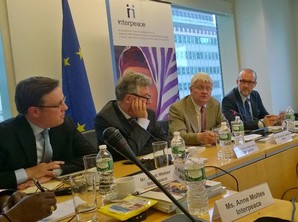High-level roundtable on priorities for peace in Mali

Together with our Malian partner the Institut Malien de Recherche Action pour la Paix (IMRAP), Interpeace shared the Self-Portrait on Obstacles to Peace in Mali, with a high-level roundtable on the Priorities for Peace. Jointly hosted by the European Delegation to the United Nations in New York, in collaboration with the Permanent Mission of Denmark to the United Nations, and Interpeace, this roundtable brought together over 40 high-level United Nations officials, representatives from various permanent missions to the UN, as well as peacebuilding experts from Mali.
The roundtable provided an opportunity to explore how Malians intend to shape the ongoing peacebuilding and reconciliation process. The discussion focused on the way forward in light of the Algiers Agreement that was partially signed in May. Ambassador Thomas Mayr Harting from the European Delegation to the United Nations opened the roundtable, reminding that “Mali is at a critical juncture in its peace process.” Under Secretary-General for Peacekeeping Operations Hervé Ladsous highlighted the “need to address the problems underlying the crisis in Mali, which is political and not only a problem of the North.” He also called for “a holistic view and approach to the process”. Similarly, while reiterating Denmark’s commitment to Mali, Deputy Permanent Representative of Denmark to the United Nations Erik Laursen emphasized that “civil society is crucial for reconciliation and peace, [and thus for the Malians’ vision] of a better future.”
Amongst the distinguished speakers at the high-level roundtable were IMRAP Director Nènè Konaté, and Interpeace Acting Regional Director for West Africa Anne Moltès. Together, they presented the Self-Portrait and Mali’s Priorities for Peace. They also reviewed the implications that this report has on policy-making in Mali. Noting the cyclical nature of conflict in Mali, Anne Moltès explained that Malians consider the current crisis to be not only a security crisis but also one of governance. Given this context, she stressed the need to find sustainable solutions that will enable change in the culture of governance, namely by reinforcing accountability and people’s participation in public affairs. Nènè Konaté continued with the positive assertion that “the dialogue process that has been carried out demonstrated Malians' capacities to analyze their situation, and is a step towards enabling them to develop their own solutions. At the same time, civil society must be reinforced in order to contribute to these solutions.”
The Self-Portrait is the result of an 18-month national participatory research process carried out by Interpeace and its partner IMRAP, and funded by the European Union, Denmark and Norway. Involving consultations of over 4,700 individuals across the nation and refugee camps in neighbouring countries, this research has enabled Malians to identify four key factors that present as obstacles to peace. These include:
- socio-political diversity and the crisis of societal values,
- the regulation of the competition over socio-economic resources and opportunities,
- the governance of access to public services, and
- the mechanisms to resolve local conflicts and armed rebellion.
In order to address these obstacles, Malians identified priority entry points: the Priorities for Peace:
- The erosion of societal values, or how to redefine living together in harmony and rules of community life and shared values?
- The limited employment opportunities for youth, or how to ensure youth employment and fair recruitment processes?
- The failure in governance, or how to establish transparent, equitable and legitimate public management?
- The chronic insecurity, or how can trust be restored between the population and the security forces?
The report is complemented by a documentary film illustrating the consultation process throughout Mali. Following the official launch of the report in Bamako, the results of the research are now being disseminated in the different regions of Mali and in refugee camps.
The Self-Portrait on Obstacles to Peace in Mali is available in English and French.
The documentary film is available here (French).
The programme Agenda pour la Paix, la réconciliation et la cohésion sociale, is implemented by IMRAP in partnership with Interpeace.
